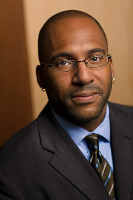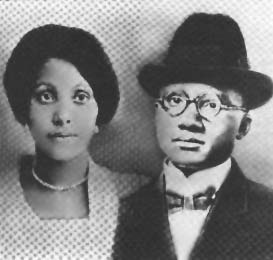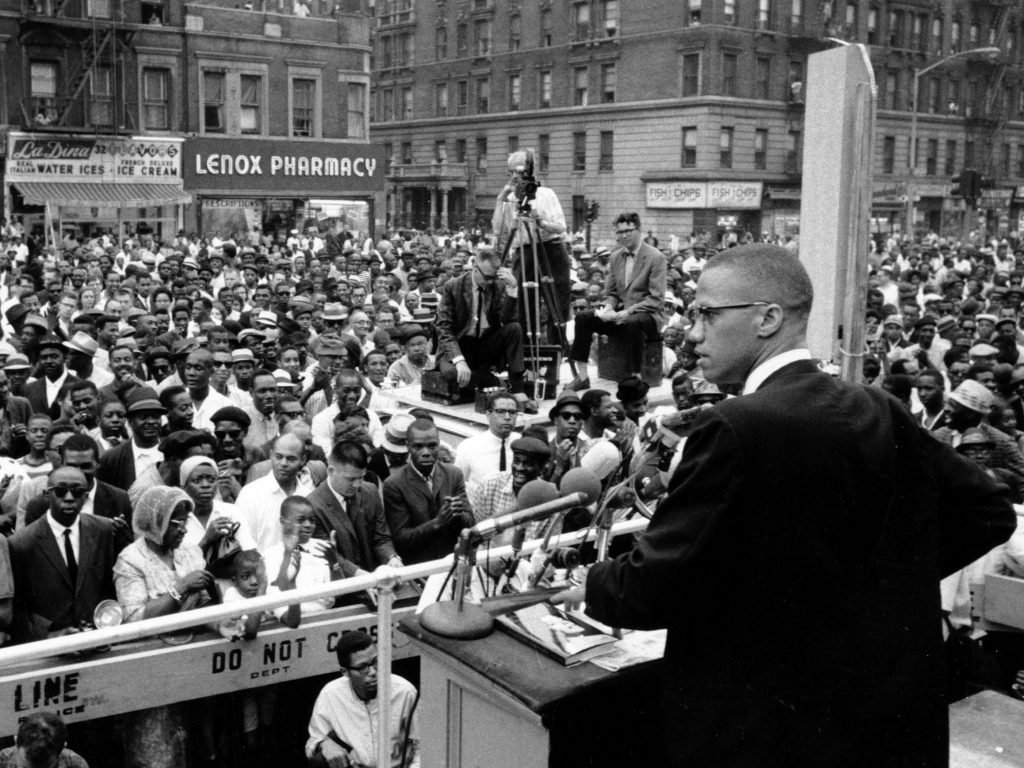On Louise Little, the Mother of Malcolm X: An Interview with Erik S. McDuffie
In today’s post, Keisha N. Blain, Senior Editor of Black Perspectives, interviews Erik S. McDuffie about his recent article in the special journal issue she edited on “Women, Gender Politics, and Pan-Africanism” with Asia Leeds and Ula Y. Taylor. This Fall 2016 issue of Women, Gender, and Families of Color examines the gendered contours of Pan-Africanism and centralizes black women as key figures in shaping, refining, and redefining Pan-Africanist thought and praxis during the twentieth century. This piece is part of a continuing series of interviews with contributors to this special issue. Previously, Kathryn Vaggalis interviewed Keisha Blain about the origins of the special issue. Azmar Williams also interviewed Ashley Farmer about how African American women forged diasporic relationships and communities. Most recently, Kami Fletcher interviewed Courtney Morris about her essay on Madame Maymie de Mena’s central role in the Universal Negro Improvement Association (UNIA). In this interview, McDuffie discusses his groundbreaking article, “The Diasporic Journeys of Louise Little: Grassroots Garveyism, the Midwest, and Community Feminism,” which explores the life, activism, and legacy of Malcolm X’s mother, Louise Langdon Norton Little. The entire special issue is now available in hard copy and online through ProjectMuse and JSTOR. Readers can download the introduction of the special issue here.
 Erik S. McDuffie is an Associate Professor in the Department of African American Studies at the University of Illinois at Urbana-Champaign. His research and teaching interests include African diaspora history, black feminism, black queer theory, black radicalism, black urban history, and black masculinity. He is the author of Sojourning for Freedom: Black Women, American Communism, and the Making of Black Left Feminism (Duke University Press, 2011). The book received the 2012 Wesley-Logan Prize from the American Historical Association-Association for the Study of African American Life and History, as well as the 2011 Letitia Woods Brown Book Prize from the Association of Black Women Historians. He is also the author of several scholarly articles and essays published in Souls: A Critical Journal of Black Politics, Culture, and Society; Journal of African American History; African Identities; African and Black Diaspora: An International Journal; Journal of West African History; Women, Gender and Families of Color; Radical History Review; American Communist History; Palimpsest: A Journal on Women, Gender, and the Black International; among other journals and edited volumes. Currently, he is working on a new book-length manuscript, tentatively titled “Garveyism in the Diasporic Midwest: The American Heartland and Global Black Freedom, 1920-80.” He recently won a National Endowment for the Humanities (NEH) Fellowship to complete this book. Follow him on Twitter @ErikSMcDuffie.
Erik S. McDuffie is an Associate Professor in the Department of African American Studies at the University of Illinois at Urbana-Champaign. His research and teaching interests include African diaspora history, black feminism, black queer theory, black radicalism, black urban history, and black masculinity. He is the author of Sojourning for Freedom: Black Women, American Communism, and the Making of Black Left Feminism (Duke University Press, 2011). The book received the 2012 Wesley-Logan Prize from the American Historical Association-Association for the Study of African American Life and History, as well as the 2011 Letitia Woods Brown Book Prize from the Association of Black Women Historians. He is also the author of several scholarly articles and essays published in Souls: A Critical Journal of Black Politics, Culture, and Society; Journal of African American History; African Identities; African and Black Diaspora: An International Journal; Journal of West African History; Women, Gender and Families of Color; Radical History Review; American Communist History; Palimpsest: A Journal on Women, Gender, and the Black International; among other journals and edited volumes. Currently, he is working on a new book-length manuscript, tentatively titled “Garveyism in the Diasporic Midwest: The American Heartland and Global Black Freedom, 1920-80.” He recently won a National Endowment for the Humanities (NEH) Fellowship to complete this book. Follow him on Twitter @ErikSMcDuffie.
Keisha N. Blain: Please briefly summarize the main goals and arguments of your article.
Erik S. McDuffie: My main objective of the article was to recover the dynamic and complex life and history of Louise Little who is best known as the mother of Malcolm X. She has been largely erased out of the story of Malcolm’s life in terms of her importance in cultivating his black radical sensibility. When she is discussed or does appear in scholarship, she is framed as a faithful wife and good mother, but not as a brilliant thinker and Garveyite grassroots activist who was foundational to the making of her most famous child.
Blain: How did you become interested in this topic?
McDuffie: First, I should say that my interest in Louse Little and Malcolm X is both personal and academic. My grandmother, with whom I was very close, was born in Toronto. Her mother—my great grandmother who lived in Toronto–was from St. Kitts. I was also very fortunate that my parents, when I was a child, purchased a vacation home in Puerto Rico and I had the opportunity as a child to travel to the Caribbean. I knew that I had family, I had roots, outside of this country and those experiences helped me to understand that we live in a large and complicated world—that the world is much larger than the United States. All that is to say is that I have a very personal interest in this project. I am from the Midwest and Louise Little did her most important work here in the heartland. Her most famous child was born in the Midwest. So, this kind of diasporic Midwestern story at one level mirrors my own life.
Going back to college, I wrote my History honors thesis on Malcolm X and I argued that his internationalist politics were critical to transforming and radicalizing him, which ultimately pushed him out of the Nation of Islam. And, so I’ve had a very long interest in Malcolm X and given my first book on black women and the US Communist Party, I’m very much interested in black women’s activism, black feminism, black radicalism, and the diaspora. Louise Little fits very well into my longstanding intellectual interests and my personal family history.

Blain: Can you tell us more about the process of conducting research for this article? What kinds of primary sources did you use in the essay?
McDuffie: Given that Louise Little was a diasporic person, a diasporic subject, that has required me to travel across the U.S., the Caribbean, and Canada, and to visit archives and various sites where she lived. I have conducted oral histories, archival research at the Schomburg and in Grenada, in Michigan, in Omaha, in Montreal, and beyond. My writing on the diaspora is mirrored by my travelling across the black world to learn more about Louise Little.
It all started in Grenada where she was born. For me, it is critical for scholars of the African diaspora to conduct primary research outside of the U.S. and preferably in the locations they are studying. Certainly I understand the time and financial cost, but scholars of the African diaspora should not only write about black subjects globally, but also travel the globe.
Getting back to Grenada, it was just extraordinary and so exciting to have the opportunity to actually set foot on the island, to see the island. It was crucial for me to walk on some of the same roads and paths where Louise Langdon, as she was known on the island, had walked and lived. The progenitors of the Langdon family, Jupiter Langdon and Mary Jane Langdon, both came from West Africa, apparently from modern-day Nigeria. They were so-called “liberated Africans” who arrived in Grenada probably in the mid-nineteenth century. Jupiter Langdon became a successful carpenter and landholder. Mary Jane Langdon was a devout wife and mother, raised her children, and worked as a domestic. Descendants of Mary Jane and Jupiter Langdon still own the land where Jupiter Langdon is buried. I had the privilege to visit this grave. It was incredibly moving. It’s on the side of a hill outside the town of La Digue on the eastern side of the island. The grave faces the Atlantic Ocean which is so telling that both Jupiter and Mary Jane came from Africa and represents the roots and routes of this family.
I also visited Omaha, Nebraska where Malcolm X was born on May 19, 1925. Being in Omaha, to see the land and hills, to see where Louise and her husband Earl Little raised their family—to see this journey was incredibly powerful. And this past December, I had the opportunity to travel to Montreal, Canada, where Louise made her first stop in North America. She left Grenada in 1917, she arrived in Montreal, and then lived there for about two years. In Montreal, she was first introduced to Garveyism through her uncle, Edgerton Langdon, the son of Mary Jane and Jupiter Langdon. In Montreal, she joined the Universal Negro Improvement Association (UNIA), founded by Marcus Garvey and Amy Ashwood Garvey, and later met Earl Little, who was from Georgia. They married in Montreal, moved down to Philadelphia, and then to Omaha in 1921. And, lastly, I’ve had the opportunity to meet with some of her grandchildren and great grandchildren. She has a very large and extended family in Michigan and elsewhere. I have had the opportunity to meet with various members of the Little family who live in Grand Rapids. I came to know a gentleman by the name of Steven Jones who was the grandson of Louise Little. He possessed an encyclopedic memory of the family. Unfortunately, he passed away a few years ago. I also have gotten to know Deborah Jones, Steven Jones’ sister, who is also brilliant and is one of the bearers of the family history.

Blain: What did you uncover about Louise Little’s political ideas and activism that you found most surprising and/or interesting?
McDuffie: I uncovered that Louise Little was a brilliant and dynamic woman, not some “crazy” or apolitical figure as she is often portrayed in the scholarship about Malcolm X. She was a committed Garveyite grassroots activist. She spoke multiple languages—English French, Patois. She taught her children the French alphabet. She insisted that her children read newspapers such as the Negro World, the official periodical of the UNIA, and newspapers from Grenada. What most intrigued me was her resilience. She was institutionalized at the Kalamazoo Mental Hospital from 1939 through 1963. But, she lived almost 30 more years after her family got her out of that hospital. Her time in that hospital can be viewed as a form of incarceration because the state targeted her because she was proud, she was independent, she owned her own land, and she refused to bow down to white supremacy and patriarchy. For these reasons, she was placed in that hospital, her land was taken away from her, and her children were put in foster homes. Despite being hospitalized for 25 years, she survived. She came out and, in her final years, she reconnected with family. She never forgot who she was and she remained strong.
Blain: What do you hope readers—including those outside of your research fields—will take away from your article?
McDuffie: First and foremost, the importance and centrality of black women to leading, building, and sustaining black movements. Black women have been the backbone of black protests and to diasporic communities. Second, the importance of women to the making of Malcolm X—his politics and legacy. Again, with no Louise Little, no Malcolm X. Not simply her role as his mother, but because she was critical to cultivating his black radical/Pan-Africanist worldview. She was foundational. Not only was Malcolm brilliant, but all of his siblings—Hilda, Wilfred, Philbert, Reginald, Wesley, Yvonne, Robert—would all go on to do amazing things professionally and personally.
I also would note that for scholars of the African diaspora, there is a need to travel, to conduct oral histories when possible, the importance of visiting and finding previously unused archival sources. I hope that my research will serve as a model for writing about the African diaspora as well as the Midwest.
Lastly, what I hope folks take away is the importance of the Midwest to shaping the politics of the black world and the ways in which the larger black world has influenced the Midwest. Too often when we discuss the African diaspora as it relates to the U.S., we talk about Harlem, or Charleston, or New Orleans. The Midwest—Ohio, Illinois, Michigan, the heartland—should not be overlooked. Richard Wright wrote in the foreword of St. Clair Drake and Horace Cayton’s magnum opus Black Metropolis that black folks in Chicago were the most radical black people on the planet. His statement could be applied more broadly to the entire Midwest region. Coming from the Jim Crow South, they had forged their politics of opposition there. In coming to northern cities like Chicago, Detroit, and Cleveland, they found new economic opportunities in auto plants, stockyards, and steel mills and political gains with the right to vote. At the same time, they encountered new, virile forms of racial oppression and terror, which helped to radicalize them. This militant consciousness would propel the Garvey movement in the Midwest and would lay the foundation for many longstanding black institutions that came out of the movement.
Copyright © AAIHS. May not be reprinted without permission.
Exciting to see new scholarship emerge on the life of Louise Little.
Thanks, Aisha!
Thanks for this insight into the mind, spirit and activism of this phenomenal woman and Mother of El Hajj Malik El Shabazz. I can see her influence on the strong, compassionate, intellectual leader we know as Malcolm X. I can’t wait to get my hands on Keisha Blain’s book.
Thanks, Shirley! I appreciate your kind words–my book comes out in Spring 2018.
Thank you for bringing this much needed insight to your readership. It brings a smile to my heart to see the result of McDuffie’s extensive and scholarly reasearch. Your thoughtful questions helped reveal aspects of Malcolm X’s ancestry we never knew.
Props to Momma Little for her role in preparing the gift of El Shabazz Malik .